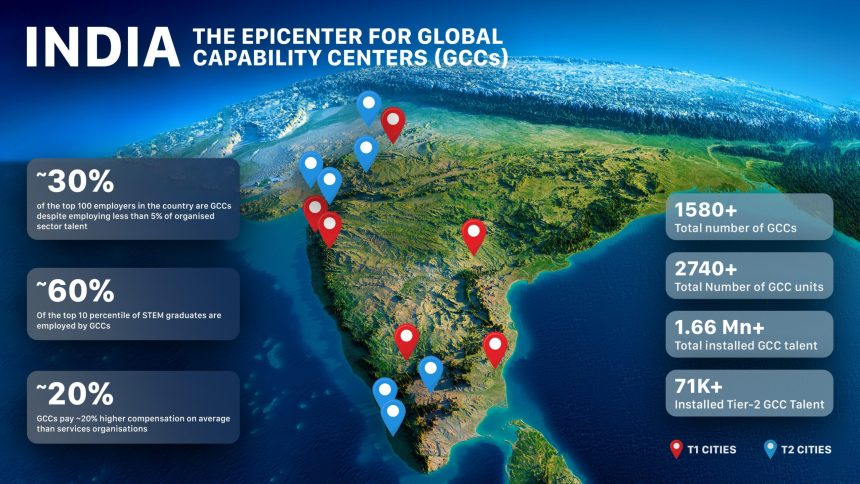Managed Workspaces are at the forefront of India’s commercial real estate evolution in 2025, playing a pivotal role in the expansion of Global Capability Centres (GCCs). As multinational corporations (MNCs) increasingly establish and grow their GCCs in India, the demand for flexible, scalable, and efficient office solutions has surged. This article delves into seven powerful trends shaping this dynamic landscape.
1. Managed Workspaces: The Preferred Choice for GCCs
India’s position as a global hub for GCCs is strengthening, with over 1,700 centers currently operational. Global Capability Centres (GCCs) have transitioned from merely supporting cost efficiencies to becoming dynamic centers that foster innovation and business transformation. Managed workspaces offer the agility and infrastructure that GCCs require, making them the preferred choice for MNCs entering the Indian market.
2. Mid-Market GCCs Driving Demand
Organizations falling within the mid-market category — with annual revenues between $100 million and $5 billion — are now playing a critical role in accelerating the need for managed workspaces throughout India. These centers are not only expanding rapidly but also seeking flexible office solutions that managed workspaces provide, facilitating quicker setup and scalability.
3. Significant Growth in Office Space Leasing
Industry projections estimate that GCCs will require an additional 45 to 50 million square feet of office space by 2026, which would make up about 42% of India’s entire commercial real estate demand. This surge underscores the critical role of managed workspaces in accommodating the expanding footprint of GCCs across the country.
4. Government Initiatives Supporting GCC Expansion
The Indian government’s proactive stance is evident through initiatives like the formation of an industry-led panel by the Ministry of Electronics and Information Technology (MeitY) to create a national framework for GCCs. Such measures aim to streamline operations and attract further global investments, indirectly boosting the managed workspace sector.
5. Emergence of Tier-II and Tier-III Cities
While metropolitan areas like Bengaluru and Hyderabad continue to be hotspots, there’s a noticeable shift towards Tier-II and Tier-III cities. Factors such as lower operational costs, availability of skilled talent, and supportive local policies make cities like Ahmedabad, Kochi, and Coimbatore attractive for GCCs, thereby increasing the demand for managed workspaces in these regions.
6. Sustainability and Green Certifications
Environmental, Social, and Governance (ESG) considerations are becoming central to workspace decisions. Over 75% of office leasing in 2024 was in green-certified buildings, highlighting the importance of sustainable practices. Managed workspaces are aligning with this trend by offering IGBC and LEED-certified spaces, catering to the eco-conscious mandates of GCCs.
7. Innovative Offerings by Managed Workspace Providers
Companies like UrbanWrk are setting new benchmarks by offering fully customizable and branded office spaces ready within 30-45 days, complete with amenities like lounges, gyms, and cafes. Such offerings not only meet the operational needs of GCCs but also enhance employee experience, making managed workspaces an integral part of GCC strategies.
Conclusion
The growing partnership between Global Capability Centres (GCCs) and Managed Workspaces is reshaping the way businesses operate in India. No longer just cost-saving setups, GCCs are now innovation hubs driving global strategies—and they need office solutions that are fast, flexible, and future-ready.
Managed workspaces fit perfectly into this picture. They offer ready-to-use, scalable, and sustainable environments that help businesses set up quickly, especially in emerging Tier-II and Tier-III cities. With added government support and rising focus on green buildings, the demand for these spaces is only going to rise.
In 2025 and beyond, managed workspaces will be at the heart of India’s business expansion, helping companies grow smarter, faster, and more sustainably. Their role as a key enabler in India’s GCC boom is just beginning.
You can check the actual and more detailed insights from here: The Economic Times
For more such insights and updates on MSMEs and business trends in India, stay connected with Udyamee India Business Magazine.


